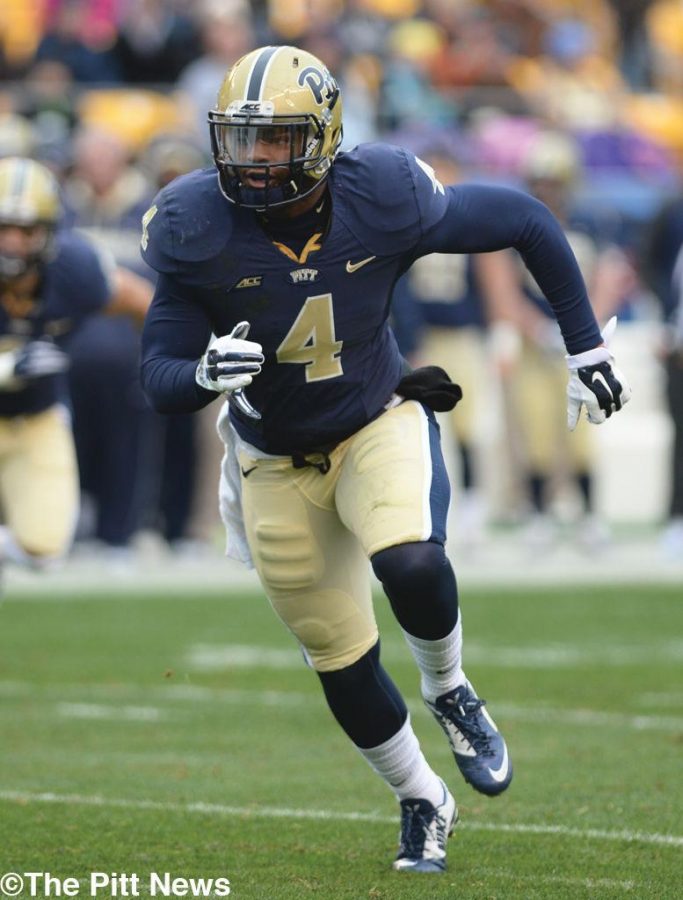Chryst, team try to stay in bowl hunt
November 13, 2014
A common theme emerged among coaches and players on the Pitt football team when they talked about this weekend’s opponent University of North Carolina: speed, especially with the ball.
This particular focus makes sense. The competition knows it well.
UNC’s Ryan Switzer embodies this attribute. The sophomore All-American wide receiver and punt returner tied the NCAA record for most punts returned for touchdowns last season with five. Two came against Pitt, the second a game-winner, in a 34-27 North Carolina win.
“It was where I really made my mark as a punt returner, so this was a big step for me as a true freshman college football player on a big stage against a team that I grew up hating,” Switzer, a Charleston, W.V., native, said to North Carolina media on Monday.
What Switzer does or doesn’t do could again be the difference in a crucial game for both teams. Entering this weekend, they are in similar positions, possessing identical records (4-5 overall, 2-3 ACC) and needing two victories in their final three games to become bowl-eligible.
“We all know — just look at last year’s film for us — how important the special teams will be and can be,” Pitt head coach Paul Chryst said.
While Switzer hasn’t scored off any punts this season, Pitt special teams coordinator Chris Haering doesn’t think that makes him any less of a threat, noting that he’s seen Switzer return three punts for touchdowns this year that were called back for penalties.
“We gotta do a great job hanging the ball up there, getting our guys time to get down and cover,” Haering said. “It’s gonna take 11 guys to stop him.”
The Carolina offense as a whole is dangerous, averaging 35 points and 423 yards a game. Quarterback Marquise Williams acts as its orchestrator.
He ranks second in the ACC — 20th in the country — in total offense, collecting 303 yards on average.
Like Switzer, Williams can create offense with his feet, leading his team in rushing yards as well as passing yards.
“On a pass, he’s going to try to get the ball downfield and throw it. It’s not just if the first look [is covered] that he’s pulling it down and going,” Chryst said. “I think he’s got good sense and a good feel for the game. That’s what makes him dangerous.”
What makes the offense dangerous as a whole is the frenetic pace at which it operates. Speaking on Monday, Chryst said the team would try and imitate it, but that only goes so far.
“You watch the film and you see the chains aren’t set, the referee is right behind the quarterback,” Chryst said, describing the Tar Heels’ tempo. “There are different ways you can do it in practice, but I think there’s nothing like actually seeing it. That’s something we’ve got to handle.”
Given the variety of ways UNC can attack effectively, Pitt redshirt sophomore linebacker Bam Bradley and the rest of the defense know how important it is to not allow them to build momentum in early down situations.
“It’ll be a good challenge for us to be able to contain their offense and get them to third and longs, second and longs,” Bradley said. “But it’s gonna start on first down, winning first down.”
Pitt ranks 20th nationally in fewest yards per game allowed — 334.8 on average. The defense also has given up 176.8 passing yards per game, good for seventh in the country and second in the ACC.
Asked how to prepare for an up-tempo team like North Carolina, freshman cornerback Avonte Maddox — who has become a starter after Reggie Mitchell’s move to safety to take over for the injured Terrish Webb — said an added emphasis on things like diet, hydration and sleep matters.
“You gotta do better this week because they’re moving faster,” he said. “No breaks or nothing.”



